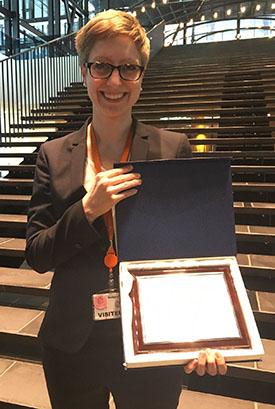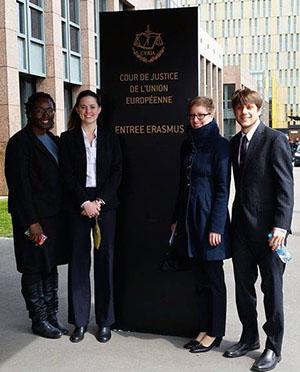Emily Hush ’18 Wins a Top Prize at the European Law Moot Court
1L Student Placed First in the Final Round of the Noted EU Competition, After Two Columbia Law School Teams Made This Year's Semi-Finals
New York, April 21, 2016—Emily Hush ’18 took home a first-place prize last week at the prestigious European Law Moot Court in Luxembourg. Hush was the only winner from an American law school and the first in the history of Columbia Law School.
Two Columbia Law School teams had advanced to the semi-final round of this year’s contest, which began in the fall with briefs from more than 80 teams representing law schools and university programs across Europe and North America. Hush’s team included Julie Nkodo ’18, Kathryn Witchger ’18, and Ani Hamparsumyan ’17. Their coach was Aaron Rogoff ’17. The team supported Hush in Luxembourg at the European Final on April 15.
| Emily Hush '18 presents her first-place prize at the European Law Moot Court in Luxembourg. |
“I feel so privileged to have been a part of this fantastic team,” said Hush. “We have been working together since September, always with the goal of making it to Luxembourg. Our hard work paid off, even more than we had imagined possible.”
Founded in 1988, the European Law Moot Court is considered the foremost moot court on European Union law and one of the most important moot court competitions in the world. Forty-eight teams—each composed of four students and a coach—are selected for oral arguments at four regional tournaments. In February Hush won the regional match in Athens, and this month she went on to the finals at the Court of Justice of the European Union in Kirchberg, Luxembourg.
Students were given a hypothetical case involving emissions trading in the European Union. A company had been fined for failing to surrender their emissions allowances, sparking a conflict between the EU’s Court of Justice and the European Court of Human Rights.
A native of Canada, Hush argued in English and French as the representative of the European Commission, making her case before a panel of two judges from the European Court of Justice and an Advocate General of the Court in Luxembourg.
Hush and her team thanked professors Anu Bradford and George A. Bermann, and instructors Delyan Dimitrov and Dana Neacsu, as well as Columbia Law School’s European Legal Studies Center, the Columbia Journal of European Law, and the European Law Moot Court alumni who helped the team travel to Luxembourg.
| First-place winner Emily Hush '18 (center right) stands with teammates Julie-Irene Nkodo '18 (left) and Kathryn Witchger'18 (center left), and coach Aaron Rogoff '17 (right) at the European Law Moot Court final in Luxembourg. |
“Emily's achievement is extraordinary,” said Bermann, the Jean Monnet Professor of EU Law, Walter Gellhorn Professor of Law, director of the Center for International Commercial and Investment Arbitration, and co-director of the European Legal Studies Center. “We have had teams competing in the advocacy finals of that competition on two prior occasions, though none has thus far won, but we have never had a student who made it that far in the extremely difficult role as ‘agent’ before the Court for the European Commission, much less won it!”
“This is a major accomplishment and sends a powerful message of what our students are capable of,” said Bradford, the Henry L. Moses Professor of Law and International Organization and co-director of the European Legal Studies Center. “Our teams competed against numerous extremely capable European teams who had extensive prior training in EU law. I could not be more proud of this result."
The competition’s winners represented Columbia Law School, the University of Ljubljana, Leiden University, and the Université Libre de Bruxelles.

